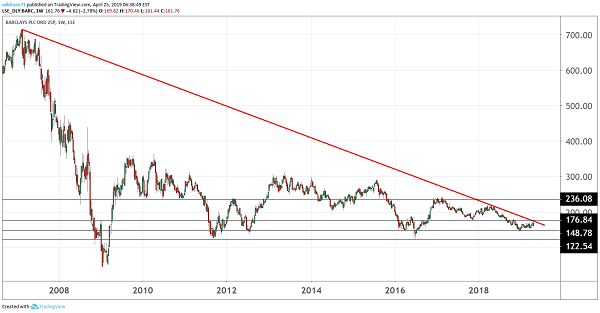
Barclays shares: Optimists see an opportunity
By Graeme Evans from interactive investor.
These results do not impress, but there’s lots going on at Barclays and plenty to interest investors.
Without the attention generated by activist investor Edward Bramson, it’s likely that last week’s lacklustre investment banking performance at Barclays (LSE:BARC) may have been passed off as just another quarter blighted by difficult market conditions.
After all, US rivals such as Goldman Sachs and JP Morgan’s corporate and investment banking arm have already reported sharp falls in Q1 profitability in recent days.
But with Bramson gunning for a seat on the Barclays board at this week’s AGM, the 11 per cent drop in income in corporate and investment banking serves to heighten scrutiny on his campaign for the division to be shrunk in favour of boosting shareholder returns.
Bramson, whose investment vehicle has built up a 5.5 per cent stake in Barclays, believes it is better to refocus the group on its lower-risk retail operations in the same way that rival Lloyds Banking Group (LSE:LLOY) has already done.
CEO Jes Staley is sticking by his strategy and points out that the investment banking division outperformed its rivals in a testing quarter that meant the bank’s overall return on tangible equity (RoTE) fell to 9.6 per cent from 11 per cent a year earlier.
He insists the bank, whose shares trade with a forward yield of just over 4 per cent, remains well-positioned to increase cash returns to shareholders whilst still maintaining a strong capital position. However, this “jam tomorrow” promise of potential buy-backs has so far failed to convince investors in spite of a large number of ‘buy’ recommendations.

Source: TradingView Past performance is not a guide to future performance
Shares have now languished below 200p for almost a year, with the stock down another 2 per cent to 163p. Broker UBS, however, continues to think the stock has the potential to be trading at 230p, while Shore Capital has reiterated its target price of 290p.
UBS analyst Jason Napier believes bombed-out UK bank share prices now offer good value, particularly as retail competition appears to have stabilised and regulators are allowing decent levels of capital returns.
Napier expects Barclays, The Royal Bank of Scotland (LSE:RBS) and Standard Chartered (LSE:STAN) to follow the lead of Lloyds and HSBC (LSE:HSBA) in starting buy-backs in the next year. Brexit clarity – if achieved – should also allow margin-enhancing rate hikes, he added.
In a note published last week, Napier said UBS had ‘buy’ recommendations on RBS and Lloyds, with price targets of 80p and 290p respectively. RBS investors will be hoping that the departure of Ross McEwan triggers an upturn in fortunes for the share price, which is almost a third lower than when he took the helm in October 2013.
In fairness to McEwan, he has delivered on the strategy he set out at the time of his arrival by retrenching from many overseas markets and bringing the group back to profit as a much slimmer entity. Investors will hear more about progress in Q1 results tomorrow.
For Barclays, last week’s performance was a mixed bag after group income came in 3 per cent below consensus but costs were better. Should softer income conditions persist, Barclays said it was in a position to cut costs deeper than the current 2019 spending guidance of between £13.6 billion and £13.9 billion.
It is sticking by its core targets to achieve RoTEs of 9 per cent in 2019 and 10 per cent in 2020. The figure was 8.5 per cent in 2018, with Barclays UK achieving a 16.7 per cent RoTE compared with 8.7 per cent for Barclays International.
The Barclays retail division nudged underlying profits 1 per cent higher to £600 million in the quarter, with continuing margin pressures offset by growth in mortgages and deposits. The RoTE was 16.4 per cent.
In international, a RoTE of 10.6 per cent reflected the drop in investment banking income due to reduced client activity, lower volatility and a smaller banking fee pool across the industry. Markets income decreased 6 per cent to £1.37 billion, while banking fees income declined 17 per cent.
UBS said: “After the US reporting season it is not news that industry capital markets income was poor in Q1. Even so, Barclays revenues were weaker than consensus in both key operating divisions.”
These articles are provided for information purposes only. Occasionally, an opinion about whether to buy or sell a specific investment may be provided by third parties. The content is not intended to be a personal recommendation to buy or sell any financial instrument or product, or to adopt any investment strategy as it is not provided based on an assessment of your investing knowledge and experience, your financial situation or your investment objectives. The value of your investments, and the income derived from them, may go down as well as up. You may not get back all the money that you invest. The investments referred to in this article may not be suitable for all investors, and if in doubt, an investor should seek advice from a qualified investment adviser.
